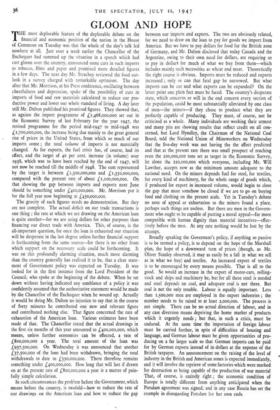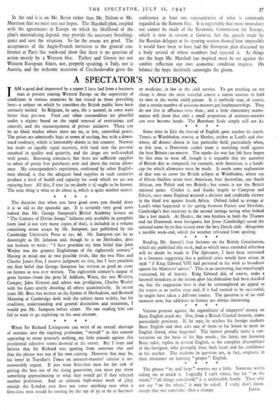GLOOM AND HOPE
THE most deplorable feature of the deplorable debate on the financial and economic position of the nation in the House of Commons on Tuesday was that the whole of the day's talk led nowhere at all. Just over a week earlier the Chancellor of the Exchequer had summed up the situation in a speech which had cast gloom over the country, announced some cuts in such imports as tobacco, films and paper and promised more detailed figures in a few days. The next day Mr. Strachey reviewed the food out- look in a survey charged with remarkable optimism. The day after that Mr. Morrison, at his Press conference, oscillating between cheerfulness and depression, spoke of the possibility of cuts in imports of food and raw materials calculated to reduce our pro- ductive power and lower our whole standard of living. A day later still Mr. Dalton published his promised figures. They showed that, as against the import programme of £1,468,000,000 set out in the Economic Survey of last February for the year 1947, the revised programme for the period mid-1947 to mid-1948 was £1,700,000,000, the increase being due mainly to the great general rise of prices in the United States, from which so much of our imports come ; the total volume of imports is not materially changed. As for exports, the fuel crisis has, of course, had its effect, and the target of 4o per cent. increase (in volume) over 1938, which was to have been reached by the end of 1947, will not now be reached till the middle of 1948. The sum represented by the target is between £1,300,000,000 and £1,350,000,000, compared with the present rate of about £1,100,000,000. On that showing the gap between imports and exports next June should be something under £400,000,000. Mr. Morrison put it for the full year now beginning at £450,000,000.
The gravity of such figures needs no demonstration. But they are not complete. The actual deficit on our trade transactions is one thing ; the rate at which we are drawing on the American loan is quite another—for we are using dollars for other purposes than financing our direct trade with America. This, of course, is the all-important question, for once the loan is exhausted our situation will be desperate in the last degree unless further financial support is forthcoming from the same source—for there is no other from which support on the necessary scale could be forthcoming. It was on this profoundly alarming situation, much more alarming than the country generally has realised it to be, that a clear state- ment of Government policy was expected on Tuesday. It was looked for in the first instance from the Lord President of the Council, who spoke at the beginning of the debate. When he sat down without having indicated any semblance of a policy it was confidently assumed that the authoritative statement would be made by the Chancellor of the Exchequer when he wound up. Actually it would be doing Mr. Dalton no injustice to say that in the course of forty minutes he contributed one new and relevant figure and contributed nothing else. That figure concerned the rate of exhaustion of the American loan. Various estimates have been made of that. The Chancellor stated that the actual drawings in the first six months of this year amounted to £400,000,000, which means, unless further economies can be effected, a rate of £800,000,000 a year. The total amount of the loan was £937,500,000. On Wednesday it was announced that another £37,500,000 of the loan had been withdrawn, bringing the total withdrawals to date to £550,000,000. There therefore remains something under £400,000,000. How long that will last if drawn on at the present rate of £800,000,000 a year is a matter of pain- fully simple calculation.
In such circumstances the prob!em before the Government, which means before the country, is twofold—how to reduce the rate of our drawings on the American loan and how to reduce the gap between our imports and exports. The two are obviously related, for we need to draw on the loan to pay for goods we import from America. But we have to pay dollars for food for the British zone of Germany, and Mr. Dalton disclosed that today Canada and the Argentine, owing to their own need for dollars, are requiring us to pay in dollars for much of what we buy from them which includes mainly such necessities as wheat and meat. Theoretically the right course is obvious. Imports must be reduced and exports increased ; only so can that fatal gap be narrowed. But what imports can be cut and what exports can be expanded? On the latter point one plain fact must be faced. The country's desperate state, which concerns or will in the end concern every section of the population, could be most substantially alleviated by one class of men—the miners—if they chose to produce what they are perfectly capable of producing. They must, of course, not be criticised as a whole. Many individuals are working their utmost and many pits are showing results that reflect credit on all con- cerned, but Lord Hyndley, the Chairman of the National Coal Board, told the National Union of Mineworkers on Wednesday that the five-day week was not having the the affect predicted and that at the present rate there was small prospect of reaching even the 200,000,000 tons set as target in the Economic Survey, let alone the 220,000,000 which everyone, including Mr. Will Lawther, accepts now as the minimum amount adequate to the national need. On the miners depends fuel for steel, for textiles, for every kind of machinery, for the whole range of goods which, if produced for export in increased volume, would begin to close the gap that must somehow be closed if we are to go on buying food and clothing on the present scale. Yet in Tuesday's debate no note of appeal or exhortation to the miners found a place. perhaps such things are useless. But there are men in the Govern- ment who ought to be capable of putting a moral appeal—far more compatible with human dignity than material incentives—effec- tively before the men. At any rate nothing would be lost by the attempt.
Broadly speaking the Goverment's policy, if anything so passive is to be termed a policy, is to depend on the hope of the Marshall plan, the hope of a downward turn of prices (though, as Mr. Oliver Stanley observed, it may as easily be a fall in what we sell as in what we buy) and textiles. An increased export of textiles is to be encouraged by every means possible. That is all to the good. So would an increase in the export of motor-cars, rolling- stock and ships and machinery be, but for all these steel is needed and steel depends on coal, and adequate coal is not there. But coal is not the only trouble. Labour is equally important. Less than 1,500,000 men are employed in the. export industries ; the number needs to be raised to at least 2,000,000. The process is not simple. There can be no actual direction of labour, and in any case diversion means depriving the home market of products which it urgently needs ; but that, in such a crisis, must be endured. At the same time the importation of foreign labour must be carried further, in spite of difficulties of housing and language, and German labour must be given opportunities of pro- ducing on a far larger scale so that German imports can be paid for by German exports instead of in dollars at the expense of the British taxpayer. An announcement on the raising of the level of industry in the British and American zones is expected immediately, and it will involve the reprieve of some factories which were marked for destruction as being capable of the production of war material That, of course, is entirely right ; the economic condition of Europe is totally different from anything anticipated when the Potsdam agreement was signed; and in any case Russia has set the example in disregarding Potsdam for her own ends. In the end it is on Mr. Bevin rather than Mr. Dalton or Mr. Morrison that we must rest our hopes. The Marshall plan, coupled with the agreements in Europe on which the likelihood of the plan's materialising depend, may provide the necessary breathing- space and save the situation. So far the omens are good. The acceptances of the Anglo-French invitation to the general con- ference at Paris • this week-end show that there is no question of action merely by a Western bloc. Turkey and Greece are not Western European States, nor, properly speaking, is Italy, nor is Austria, and the welcome accession of Czechoslovakia gives the conference at least one representative of what is commonly regarded as the Eastern bloc. It is regrettable that more immediate use cannot be made of the Economic Commission for Europe, which is now in session at Geneva, but the speech made by the Russian delegate at its opening session showed how impossible it would have been to have had the European plan discussed by a body several of whose members had rejected it. As things are the hope Mr. Marshall has inspired must be set against the sombre reflection our own economic condition inspires. On balance the hope decisively outweighs the gloom.



































 Previous page
Previous page